Want to buy Bitcoin but don’t know if it’s the right time? Or maybe you’re wondering when to sell Bitcoin and lock in profits before the next dip. Timing the market isn’t easy. However, we have good news. You don’t need a crystal ball; just the right Bitcoin trading strategy.
From spotting the best time to buy Bitcoin to understanding crypto market cycles and using technical analysis, this guide breaks down 12 smart strategies to help you trade like a pro. Here’s how to master buying low and selling high.
In this guide:
- When to buy Bitcoin: 6 smart entry strategies
- When to sell Bitcoin: 6 key exit strategies
- Top mistakes to avoid in Bitcoin trading
- So, when should you buy Bitcoin?
- Frequently asked questions
When to buy Bitcoin: 6 smart entry strategies
There’s no magic number when it comes to buying Bitcoin. You’re not just looking for a “good price”; you’re trying to avoid buying the top. To pull that off, you need a Bitcoin trading strategy that makes sense no matter what the market’s doing. Let’s break it down:
Buying the dip
Everyone wants to purchase BTC at the lowest possible price and sell high, but how do you know if Bitcoin is actually in a buyable dip or just heading lower?
A true dip happens when Bitcoin experiences a temporary pullback in an uptrend; a bear trap is when it fakes a recovery before falling further.
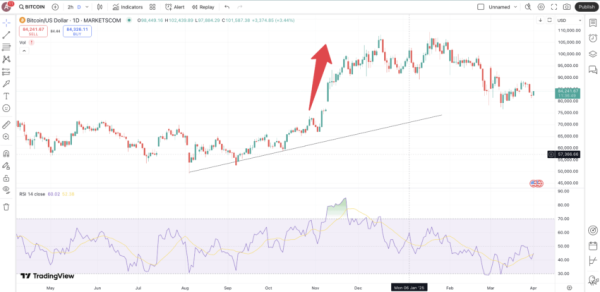 When to sell or buy Bitcoin using trends: TradingView
When to sell or buy Bitcoin using trends: TradingView
Using technical indicators to time your entry
Bitcoin price indicators can help confirm if it’s a good time to buy, if you know how to read them correctly.
- RSI (Relative Strength Index): Below 30 means BTC is oversold and might be due for a bounce.
- Moving Averages (MA & EMA): If BTC is above the 50-day and 200-day moving averages, it’s in a strong trend.
- MACD crossover: A bullish MACD crossover can signal the start of an uptrend.
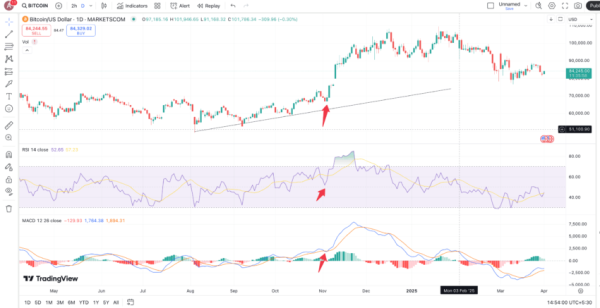 When to sell or buy BTC using multiple indicators: TradingView
When to sell or buy BTC using multiple indicators: TradingView
Buying during market corrections vs. crashes
Not all dips are the same. A market correction (10-20% drop) is a normal part of a bull run, while a crash (30%+ drop) could signal deeper problems.
- Corrections: Healthy pullbacks in a strong market, often caused by profit-taking.
- Crashes: Triggered by panic selling, liquidations, or major macro events.
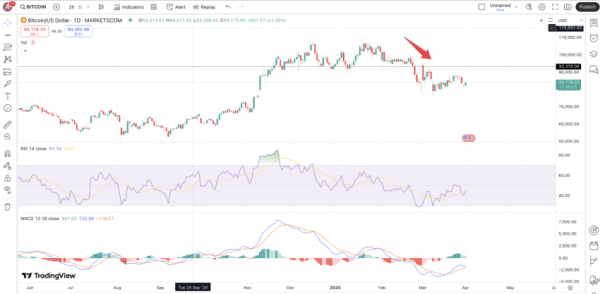 When to sell Bitcoin seeing a market correction: TradingView
When to sell Bitcoin seeing a market correction: TradingView
Buying based on fundamentals
Focusing on Bitcoin adoption trends and on-chain analytics to time your buys is a tried-and-tested strategy. Here are a few key pointers:
- Institutional accumulation: Big players buying BTC is often a bullish signal.
- Network growth: More active wallets and transactions indicate long-term demand.
- Hash rate trends: A rising hash rate means a stronger, more secure network.
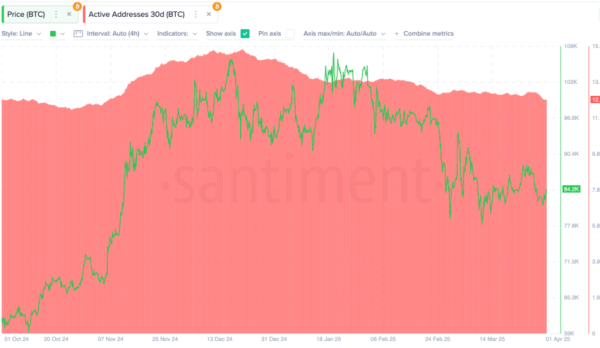
When to sell or buy Bitcoin using network activity: Santiment
Using market sentiment and volume analysis
Sentiment can be a powerful trading tool if you know how to read it.
- Fear & Greed Index: Extreme greed = possible top. Extreme fear = potential opportunity.
- Funding rates: High funding rates mean excessive leverage—usually a sign of an incoming correction.
- Trading volume: A price move backed by strong volume is more reliable than one with low volume.
 BTC/USD average: Coinalyze
BTC/USD average: Coinalyze
Choosing the best time of the week to buy BTC
Does it really matter what time or day you buy Bitcoin? Some traders believe so.
- Weekends: Lower liquidity = potential flash crashes and quick dips.
- Mondays & Fridays: Institutional moves can create big price swings.
- Late-night hours: Bitcoin often sees low-volume dips overnight.
When to sell Bitcoin: 6 key exit strategies
Buying Bitcoin is relatively easy. But knowing when to sell Bitcoin is the real challenge. Sell too early, and you leave money on the table. Sell too late, and you risk watching your profits disappear.
Here are a few strategies to help:
Selling at resistance levels
Every Bitcoin run ends eventually. There always comes a price level where selling pressure builds up, and BTC struggles to move any higher. These resistance levels are where smart traders take profits instead of hoping for “one more pump.”
 When to sell Bitcoin if resistance is breached: TradingView
When to sell Bitcoin if resistance is breached: TradingView
Using technical indicators to exit smartly
Just like they help with entries, Bitcoin technical analysis tools can tell you when to get out before a downtrend starts.
- RSI overbought conditions: When RSI is above 70, Bitcoin may be overvalued.
- MACD bearish crossover: When the MACD line crosses below the signal line, it signals weakening momentum.
- Divergence: If the price is making higher highs, but the RSI is making lower highs, a reversal might be coming.
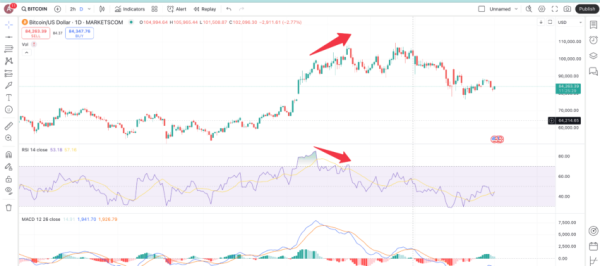 When to sell Bitcoin tracking divergence: TradingView
When to sell Bitcoin tracking divergence: TradingView
Selling in bull markets vs. panic selling in dips
Not every dip is a reason to panic, but not every rally lasts forever. The key is taking profits gradually instead of panic selling.
- Bull markets: Sell in phases — instead of dumping everything at once, offload small portions as BTC climbs.
- Bear markets: Avoid panic selling at extreme lows — if you’re already deep in losses, waiting for a recovery might be better.
Setting stop-loss orders to protect profits
Crypto moves at breakneck speeds. If you’re not careful, gains can go poof overnight. That’s why experienced traders use stop-loss orders to automatically sell Bitcoin if prices drop past a certain level.
- Regular stop-loss: A fixed price where your BTC sells automatically to limit losses.
- Trailing stop-loss: Moves up as BTC rises, locking in profits while keeping the upside open.
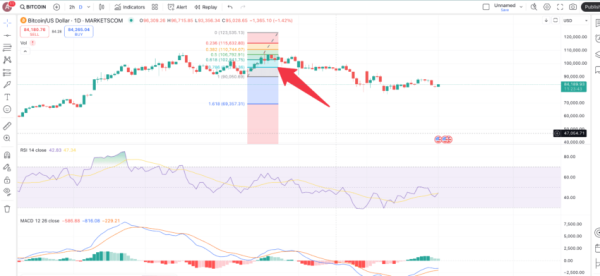 when to sell Bitcoin using stop loss: TradingView
when to sell Bitcoin using stop loss: TradingView
Focus on institutional traders and whales
Retail traders tend to dump everything at once. However, whales and institutional traders approach selling Bitcoin a tad differently:
- OTC (Over-the-Counter) trades: Big players sell directly to buyers instead of dumping on exchanges.
- Sell walls: Placing large sell orders slowly instead of all at once.
- Distribution phases: Selling gradually over time to avoid shocking the market.
Be aware of the tax considerations while selling
Selling Bitcoin isn’t just about market timing; it’s also about tax efficiency.
- Short-term vs. long-term gains: Holding Bitcoin for over a year usually means lower taxes.
- Tax-loss harvesting: Selling at a loss to offset other taxable gains.
- Tax-friendly jurisdictions: Some countries have zero crypto tax. This is worth knowing more about if you trade large volumes.
Bitcoin isn’t about “diamond hands” vs. “paper hands” — it’s about smart hands. Selling at the right time means balancing technical analysis, market cycles, and risk management in crypto to maximize gains without emotional decision-making.
Top mistakes to avoid in Bitcoin trading
Now that we’ve walked through when to buy and when to sell Bitcoin, one thing is obvious. Most people don’t mess up because of bad strategies. They mess up because they ignore them.
Here are five common mistakes that trip up even the smartest traders. Avoid these, and you’re already ahead of the game:
- Buying during extreme FOMO
- Ignoring technical and fundamental signals
- Overtrading with high-leverage
- Selling too early or too late without a plan
- Changing your strategy mid-trade
So, when should you buy Bitcoin?
You don’t need to be perfect; you just need to be strategic. The best traders know when to buy Bitcoin, when to sell Bitcoin, and, most importantly, when to sit back and do nothing (like right now)!
Whether you’re riding the wave of a Bitcoin halving, tracking market sentiment, or using tools like RSI and MACD for entries and exits, the secret isn’t timing the top or bottom — it’s avoiding those little mistakes in between. So take profits without guilt. Be patient when the market is cold, and never stop educating yourself.